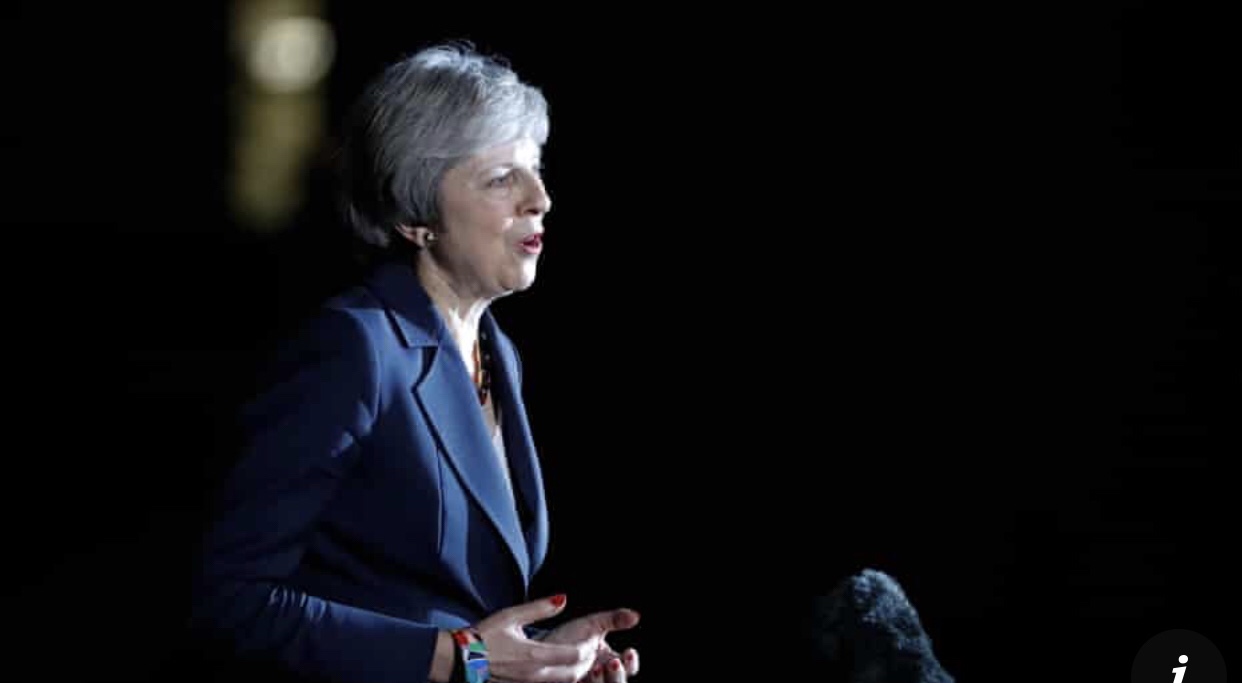Theresa May wins cabinet backing for Brexit deal
PM says ministers have agreed to support her plan after long and ‘impassioned’ debate tonight.
One step. Many steps to go.
Theresa May said she believed with “my head and my heart” that her Brexit deal was the best one for Britain, after securing the backing of her ministers for it during a five-hour cabinet meeting.

In a brief statement outside 10 Downing Street, the prime minister said her cabinet had taken a “collective” decision to press ahead with the deal – which she will then have to bring back to parliament for approval.
“This is a decision that was not taken lightly, but I believe it is firmly in the national interest,” May said, adding that her colleagues had had a “long, detailed and impassioned” debate.
“When you strip away the detail, this deal delivers on the vote of the referendum, takes back control of our money, our laws and our borders and ends free movement,” she said.
“There will be difficult days ahead, this deal will come under intense scrutiny and that is entirely as it should be and entirely understandable.
“Let me end by saying this: what I owe to this country is to make decisions in the national interest and I firmly believe that, with my head and my heart, this deal is in the best interest of our entire United Kingdom.”
Downing Street had concerns that some pro-Brexit ministers might walk out, rather than support a deal they fear cannot pass the House of Commons.
May held one-to-one meetings with key ministers, including Penny Mordaunt and Andrea Leadsom, on Tuesday night and Wednesday morning, in a bid to assuage their concerns that the UK could slide into a permanent customs union with the EU.
Scottish Conservatives, including the Scottish secretary, David Mundell, who attended the crunch meeting, had also sought assurances over fishing rights.
Rumours were swirling at Westminster on Wednesday night that some discontented pro-Brexit Conservative MPs could seek a vote of no confidence on Thursday by submitting a fresh flurry of letters to Sir Graham Brady, the chair of the backbench 1922 Committee.
If the total number of such letters reaches 48, Brady would have to announce a confidence vote. Jacob Rees-Mogg, the chair of the backbench European Research Group (ERG), said he was “not surprised” if colleagues sent letters, but “the ERG does not have a collective view”.
While all eyes have been on the cabinet’s reaction to the draft deal, it has also been met with expressions of serious concern among key member states, including France, which is expected to demand further concessions.
Brussels is expected to confirm that it will convene a special EU summit to sign off on the deal on 25 November, after EU ambassadors held their own lengthy meeting on Wednesday.
The final deal, to be put to MPs, will include the full text of the political declaration on Britain’s future trading relationship, some aspects of which have not yet been negotiated.
Cabinet ministers have only seen a seven-page outline of this political declaration, along with a document of more than 400 pages setting out the withdrawal agreement – effectively the divorce terms.
Several Brexiter ministers were unhappy about the terms of the deal. One senior leaver said it was “worse than expected”, while another said: “Several people are not in a happy place.”
However, May appeared to have secured the support of her cabinet for now, allowing her to press on with putting the agreement to MPs in a “meaningful vote”, likely to be held early next month.
The parliamentary arithmetic looks very tight. The DUP, whose 10 votes the Conservatives rely on for her majority, rubbished the deal before it had even been published, with the party’s Brexit spokesman, Sammy Wilson, describing it as a “punishment beating”.
He told Sky News: “This is all about a punishment beating for the UK because they dared to vote to leave the EU. And unfortunately the prime minister has allowed that punishment beating to be administered. That punishment beating in my belief will damage the UK and damage the UK constitution.”
The DUP are wary of any arrangement that gives Northern Ireland a different status to the rest of the UK.
May’s brief statement followed an afternoon of confusion, with a plan to hold a full press conference hastily cancelled after MPs complained that it was unconstitutional for the prime minister to address journalists before she had come to parliament.
Downing Street had expected the meeting to be over within three hours, but as it overran, the Brexit secretary, Dominic Raab, cancelled plans to travel to Brussels to meet the EU’s chief negotiator, Michel Barnier.
Earlier, at prime minister’s questions, where she faced hostile questions from Brexiters, May insisted: “We will not rerun the referendum, we will not renege on the decision of the British people, we will leave the customs union, we will leave the common fisheries policy, we will leave the common agricultural policy, and we will take back control of our money, laws and borders. We will deliver Brexit and the United Kingdom is leaving the European Union on 29 March 2019.”
She was also keen to stress that the backstop – the most contentious aspect of the agreement – was an “insurance policy”, which the government hoped not to use.
“There needs to be a backstop as an insurance policy, but neither side actually wants us to be in that backstop, because we want to bring the future relationship into place at the end of December 2020,” she said.
Source: The Guardian
You must be logged in to post a comment.